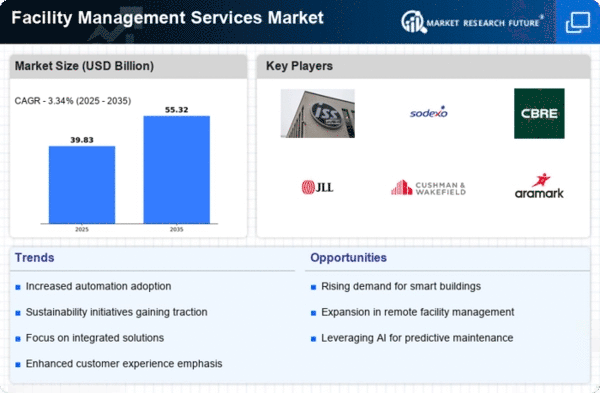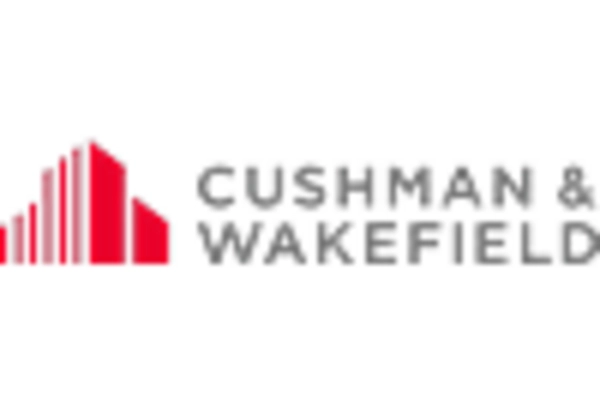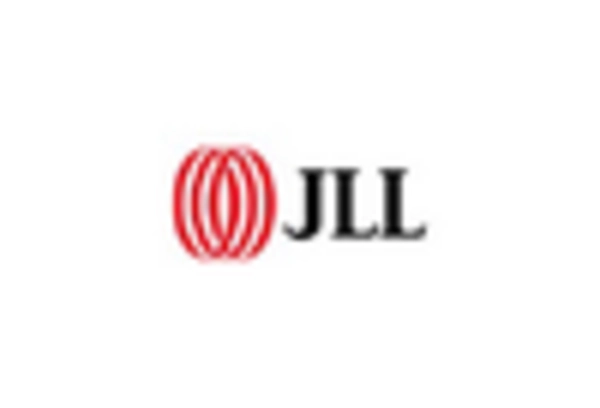Regulatory Compliance
Regulatory compliance is a significant driver within the Global Facility Management Services Market Industry. Organizations must adhere to various regulations concerning health, safety, and environmental standards. Non-compliance can result in substantial penalties and reputational damage. Consequently, facility management services that ensure compliance with these regulations are in high demand. This need for compliance drives organizations to invest in comprehensive facility management solutions that can navigate complex regulatory landscapes. As the regulatory environment continues to evolve, the market is expected to adapt, further solidifying the role of facility management in maintaining compliance and operational integrity.
Increasing Urbanization
The Global Facility Management Services Market Industry is experiencing growth driven by increasing urbanization. As more people migrate to urban areas, the demand for efficient facility management services rises. Urban centers require comprehensive management of buildings, infrastructure, and services to accommodate growing populations. This trend is evident in cities worldwide, where the need for maintenance, security, and operational efficiency becomes paramount. The Global Facility Management Services Market is projected to reach 38.5 USD Billion in 2024, reflecting the urgency for effective management solutions in densely populated regions. Urbanization not only increases demand but also necessitates innovative approaches to facility management.
Sustainability Initiatives
Sustainability initiatives are becoming a focal point within the Global Facility Management Services Market Industry. Organizations are increasingly prioritizing environmentally friendly practices, which include energy efficiency, waste reduction, and sustainable sourcing. This shift is driven by regulatory pressures and growing consumer awareness regarding environmental issues. Facility management services that incorporate sustainability practices not only enhance corporate reputation but also lead to operational cost savings. As a result, the market is likely to see a compound annual growth rate of 3.34% from 2025 to 2035, reflecting the increasing importance of sustainability in facility management strategies.
Technological Advancements
Technological advancements play a crucial role in shaping the Global Facility Management Services Market Industry. The integration of smart technologies, such as IoT and AI, enhances operational efficiency and reduces costs. These technologies enable real-time monitoring of facilities, predictive maintenance, and improved energy management. For instance, smart building solutions can optimize energy consumption, leading to significant cost savings. As organizations increasingly adopt these technologies, the market is expected to grow, with projections indicating a rise to 55.3 USD Billion by 2035. The ongoing digital transformation within the facility management sector suggests a shift towards more data-driven decision-making processes.
Workplace Safety and Health
Workplace safety and health considerations are increasingly influencing the Global Facility Management Services Market Industry. Organizations are recognizing the importance of providing safe working environments to enhance employee productivity and satisfaction. Facility management services that prioritize safety protocols, regular maintenance, and health measures are essential in mitigating risks associated with workplace hazards. This focus on safety not only protects employees but also reduces liability for organizations. As a result, the demand for facility management services that emphasize safety is likely to grow, contributing to the overall expansion of the market.
Market Trends and Projections
The Global Facility Management Services Market Industry is characterized by various trends and projections that indicate its future trajectory. The market is expected to reach 38.5 USD Billion in 2024 and is projected to grow to 55.3 USD Billion by 2035. This growth reflects a compound annual growth rate of 3.34% from 2025 to 2035. Key trends influencing this growth include the increasing adoption of technology, the emphasis on sustainability, and the need for regulatory compliance. These trends suggest a dynamic market landscape that is evolving to meet the changing needs of organizations and their facility management requirements.
















